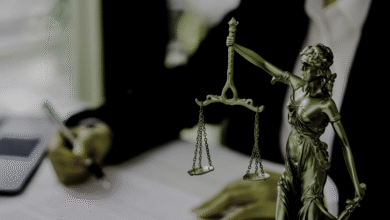
How Bail Works: What You Need to Know Before Paying
Understanding how bail works is crucial for anyone navigating the legal system, whether for themselves or a loved one.
Understanding how bail works is crucial for anyone navigating the legal system, whether for themselves or a loved one. Bail is a financial arrangement that allows an accused person to be released from custody while awaiting trial, ensuring their return to court for legal proceedings. However, the process can be complex and overwhelming, especially for those unfamiliar with the legal system. This article provides a comprehensive guide to how bail works, the factors that influence bail amounts, and what you need to know before paying bail. By the end, you’ll have a clearer understanding of the bail process and how to make informed decisions.
The Purpose of Bail
Bail serves as a guarantee that an accused person will appear in court for their scheduled hearings. It is not a punishment but rather a mechanism to ensure compliance with the legal process. When someone is arrested, they are taken into custody and brought before a judge for an initial hearing, often called an arraignment. During this hearing, the judge determines whether the accused is eligible for Bail Works and, if so, sets the bail amount. The purpose of bail is to balance the rights of the accused with the need to protect public safety and ensure the integrity of the judicial process.
The concept of bail is rooted in the presumption of innocence, which holds that an individual is considered innocent until proven guilty. By allowing the accused to remain free while awaiting trial, Bail Works enables them to continue working, supporting their family, and preparing their defense. However, bail is not granted automatically. Judges consider several factors when deciding whether to set bail, including the severity of the alleged crime, the accused’s criminal history, and their ties to the community.
Types of Bail
There are several types of bail, each with its own requirements and conditions. The most common form is cash bail, which requires the full bail amount to be paid in cash or through a certified check. If the accused attends all court appearances, the bail money is refunded at the end of the case, minus any administrative fees. However, if the accused fails to appear in court, the bail is forfeited, and a warrant may be issued for their arrest.
Another option is a bail bond, which involves a third party, typically a bail bondsman. In this arrangement, the bondsman pays the bail amount on behalf of the accused in exchange for a non-refundable fee, usually around 10% of the total bail. The bondsman also requires collateral, such as property or assets, to secure the bond. If the accused fails to appear in court, the bondsman is responsible for paying the full bail amount and may use the collateral to cover the loss.
In some cases, the court may release the accused on their own recognizance (OR), meaning no bail payment is required. This option is typically reserved for individuals charged with minor offenses who have strong ties to the community and a low risk of fleeing. Alternatively, the court may impose conditions such as electronic monitoring or regular check-ins with a probation officer as part of the release agreement.
Factors That Influence Bail Amounts
The amount of bail set by the judge depends on several factors, including the nature and severity of the alleged crime. More serious offenses, such as violent crimes or felonies, typically result in higher bail amounts. Conversely, minor offenses like misdemeanors may have lower bail amounts or no bail requirement at all. The judge also considers the accused’s criminal history. Individuals with prior convictions or a history of failing to appear in court are more likely to face higher bail amounts or be denied bail altogether.
Another critical factor is the accused’s ties to the community. Judges are more likely to set lower bail amounts for individuals who have stable employment, family connections, and a history of residing in the area. These factors suggest that the accused is less likely to flee and more likely to comply with court requirements. Additionally, the judge may consider the accused’s financial resources when setting bail. While the Eighth Amendment prohibits excessive bail, the amount must be sufficient to ensure the accused’s appearance in court.
The Bail Hearing Process
The bail hearing is a critical step in the legal process, as it determines whether the accused will be released from custody and under what conditions. During the hearing, the judge reviews the charges, the accused’s criminal history, and any other relevant factors. The prosecution and defense may present arguments regarding the appropriate bail amount or whether bail should be granted at all. The accused’s attorney may highlight factors such as strong community ties, employment, and lack of prior convictions to argue for lower bail or release on recognizance.
It’s important to note that bail hearings are not always immediate. In some jurisdictions, the accused may remain in custody for several days before a hearing is held. During this time, they may be held in a local jail or detention center. For this reason, it’s essential to consult with an experienced attorney who can advocate for the accused’s release and ensure their rights are protected throughout the process.
Paying Bail: What You Need to Know
If bail is granted, the next step is to arrange for payment. As mentioned earlier, cash bail requires the full amount to be paid upfront. This can be a significant financial burden, especially for high bail amounts. In such cases, a bail bond may be a more feasible option. However, it’s important to understand the terms and conditions of the bond agreement, including the non-refundable fee and collateral requirements.
Before paying bail, it’s crucial to verify the legitimacy of the bail bondsman or agency. Unfortunately, there are unscrupulous individuals who take advantage of vulnerable families during this stressful time. Ensure that the bondsman is licensed and has a good reputation. Additionally, carefully review the bond agreement and ask questions about any terms you don’t understand. Remember, once the bond is signed, you are legally obligated to fulfill its conditions.
Consequences of Skipping Bail
Failing to appear in court after being released on bail has serious consequences. If the accused does not show up for a scheduled hearing, the court may issue a bench warrant for their arrest. Additionally, the bail money or collateral will be forfeited, and the accused may face additional charges for failing to appear. In the case of a bail bond, the bondsman may hire a bounty hunter to locate and apprehend the accused.
Skipping bail not only jeopardizes the accused’s legal case but also creates financial and legal problems for their family or friends who may have co-signed the bond or provided collateral. For this reason, it’s essential to take the conditions of bail seriously and ensure that all court appearances are attended as required.
Alternatives to Bail
In recent years, there has been growing criticism of the bail system, particularly its impact on low-income individuals who cannot afford to pay Bail Works. As a result, some jurisdictions have implemented alternatives to traditional bail. One such alternative is supervised release, where the accused is released under the supervision of a probation officer or pretrial services agency. This option may include conditions such as regular check-ins, drug testing, or participation in counseling programs.
Another alternative is the use of risk assessment tools, which evaluate the likelihood of the accused fleeing or committing another crime while released. These tools help judges make more informed decisions about Bail Works and reduce the reliance on financial conditions. Additionally, some jurisdictions have eliminated cash Bail Works for certain offenses, focusing instead on non-monetary conditions for release.
The Role of an Attorney in the Bail Process
An experienced criminal defense attorney plays a crucial role in the bail process. They can advocate for the accused during the bail hearing, presenting evidence and arguments to support a lower bail amount or release on recognizance. Additionally, an attorney can help the accused and their family understand the bail process, explore payment options, and ensure that their rights are protected.
If bail is denied, an attorney can file a motion for reconsideration or appeal the decision. They can also assist with navigating the legal system, preparing a defense, and addressing any issues that arise during the pretrial period. Having a knowledgeable attorney on your side can make a significant difference in the outcome of your case.
Read More: Arrested? What to Do Next to Protect Your Legal Rights
Conclusion
Understanding how bail works is essential for anyone involved in the legal system. Bail serves as a critical tool to ensure that accused individuals appear in court while allowing them to remain free during the pretrial period. However, the process can be complex, with various factors influencing Bail Works amounts and conditions. By familiarizing yourself with the types of bail, the factors that influence bail decisions, and the consequences of skipping bail, you can make informed decisions and navigate the process more effectively.
Ultimately, the goal of bail is to balance the rights of the accused with the need to protect public safety and ensure the integrity of the judicial process. Whether you are paying bail for yourself or a loved one, it’s important to seek guidance from an experienced attorney and carefully consider your options. By doing so, you can protect your rights, minimize financial burdens, and work toward a favorable resolution of your case.
FAQs
What is bail, and how does it work?
Bail is a financial arrangement that allows an accused person to be released from custody while awaiting trial, ensuring their return to court for legal proceedings.
What factors influence the bail amount?
The bail amount is influenced by the severity of the crime, the accused’s criminal history, ties to the community, and financial resources.
What happens if someone skips bail?
Skipping bail results in a warrant for arrest, forfeiture of bail money or collateral, and potential additional charges for failing to appear in court.
What are alternatives to traditional bail?
Alternatives include supervised release, risk assessment tools, and non-monetary conditions for release, particularly in jurisdictions reforming the bail system.
Why is it important to consult an attorney for bail?
An attorney can advocate for lower bail, explain the process, protect your rights, and help you navigate the legal system effectively.








One Comment